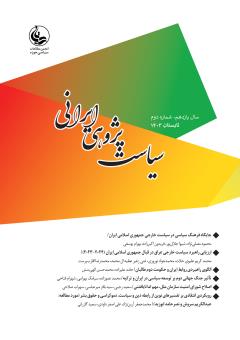تحریمهای بینالمللی علیه جمهوری اسلامی ایران و تغییر الگوهای قدرت در منطقه غرب آسیا
محورهای موضوعی : سیاست پژوهی ایرانی (سپهر سیاست سابق)
بهروز حاتمی
1
,
مهدی خوش خطی
2
*
![]() ,
سید فرشید جعفری
3
,
سید فرشید جعفری
3
![]()
1 - دانشجوی دکتری، گروه علوم سیاسی، واحد زنجان، دانشگاه آزاد اسلامی، زنجان، ایران.
2 - استادیار، گروه علوم سیاسی، واحد زنجان، دانشگاه آزاد اسلامی، زنجان، ایران
3 - استادیار، گروه علوم سیاسی، واحد زنجان، دانشگاه آزاد اسلامی، زنجان، ایران.
کلید واژه: تحریمهای بینالمللی, جمهوری اسلامی ایران, الگوهای قدرت, منطقه غرب آسیا, امریکا, انرژی هستهای.,
چکیده مقاله :
پژوهش حاضر درصدد است با استفاده از روش توصیفی- تحلیلی جهت آزمون فرضیهها، در کنار بهرهگیری از نظریه رژیمهای بینالمللی، به این پرسش پاسخ دهد که تحریمهای بینالمللی علیه جمهوری اسلامی ایران چه تاثیری بر تغییر الگوهای موازنه قدرت در منطقه غرب آسیا داشته است؟ یافتههای پژوهش حاکی از آن است که تحریمهای بینالمللی علیه جمهوری اسلامی ایران، باعث تغییرات عمدهای در سیاستهای نظامی، اقتصادی و دیپلماتیک ایران در منطقه غرب آسیا شده و به افزایش رقابتها و تنشهای منطقهای دامن زده است. این تحریمها اگرچه اثرات منفی بر اقتصاد ایران داشته است، اما نتوانسته به طور کامل اهداف غرب را در قبال این کشور محقق نماید و بیشتر منجربه افزایش تنشهای ژئوپلیتیک در منطقه گردیده است. از طرفی، جمهوری اسلامی ایران از طریق ابزارهای دیپلماتیک و شبکههای غیررسمی و راههای جایگزین، توانسته بهنوعی این فشارها را کاهش داده و همچنان نفوذ خود را در منطقه تداوم بخشد. علاوهبر این، جمهوری اسلامی ایران با وجود فشار اقتصادی ناشی از تحریمها، با تقویت قدرت نظامی و تداوم حمایت از محور مقاومت در کشورهایی مانند عراق، سوریه، لبنان و یمن، توانسته است نقشی کلیدی در معادلات منطقهای غرب آسیا ایفا نموده و همچنان بهعنوان یک بازیگر تأثیرگذار در منطقه به ایفای نقش بپردازد.
Using a descriptive-analytical method and employing the theory of international regimes, this study addresses the question: how have international sanctions against the Islamic Republic of Iran affected shifts in power dynamics in West Asia? The findings indicate that international sanctions have brought substantial changes to Iran’s military, economic, and diplomatic policies in the region, intensifying regional rivalries and tensions. Although these sanctions have negatively impacted Iran’s economy, they have not fully achieved the West’s objectives against the country and have, instead, contributed to increased geopolitical tensions in the region. On
the other hand, the Islamic Republic of Iran has mitigated these pressures through diplomatic tools, informal networks, and alternative pathways, maintaining its influence in the region. Furthermore, despite the economic challenges imposed by the sanctions, Iran has bolstered its military power and continued its support for the "Axis of Resistance" in countries like Iraq, Syria, Lebanon, and Yemen, asserting a pivotal role in regional equations and remaining a key player in West Asia.
حشمتزاده، محمدباقر (1384). مقدمه و چارچوبی برای بررسی تاثیرات انقلاب اسلامی در کشورهای اسلامی. پژوهش، شماره 12، ص212-234.
خواجی، غلامرضا (1391). تحریم اقتصادی از منظر حقوق بینالملل با تاکید بر حقوق بینالملل اقتصادی و حق توسعه. حقوق اقتصادی، (2)19، ص1-20.
سجادپور، سید کاظم؛ وکیلی، فرهاد (1394). رژیم تحریمهای بینالمللی: بنیانها، فرایندهای تصمیمساز، نهادهای مجری و سنجش کارایی. روابط خارجی، (1)7، ص39-64.
قادری کنگاوری، روحالله (1392). نظریه مقاومت در روابط بینالملل؛ رویکرد ایرانی- اسلامی نفی سبیل و برخورد با سلطه. سیاست دفاعی، 21(82)، ص191-248.
لیتل، ر. (۱۳۸۳). رژیمهای بینالمللی. در: جان بیلس و استیو اسمیت: جهانی شدن سیاست: روابط بینالملل در عصر نوین، ترجمه ابوالقاسم راهچمنی و همکاران. تهران: موسسه مطالعات فرهنگی ابرار معاصر.
مختاری هشی، حسین (1394). تاثیر تحریمهای بینالمللی بر عوامل قدرت ملی؛ با تاکید بر تحریمهای شورای امنیت سازمان ملل بر علیه جمهوری اسلامی ایران. ژئوپلیتیک، 11(2)، ص134-173.
Bajoghli, N. (2023). Iran in Latin America: Building Alliances for Busting Economic Sanctions. Humanity: An International Journal of Human Rights, Humanitarianism, and Development, 14(2), p. 309-324.
Cordesman, A.H. (2009). Iranian Weapons of Mass Destruction: The Birth of a Regional Nuclear Arms Race? Praeger, Available at: https://a.co/d/6qoTDbW
Felbermayr, G.J., Syropoulos, C., Yalcin, E. & Yotov, Y. (2019). On the effects of sanctions on trade and welfare: New evidence based on structural gravity and a new database. CESifo Working Paper, No. 7728. Available at:
https://www.cesifo.org/en/publications/2019/working-paper/effects-sanctions-trade-and-welfare-new-evidence-based-structural
Fitzpatrick, M. (2019). Iran's Ballistic Missile Capabilities: A Net Assessment. International Institute for Strategic Studies.
FMSO (2023). Iran's Strategic Alliances in Africa: A Growing Influence. Foreign Military Studies Office.
Garoupa, N.R. & Gata, J.E. (2002). A theory of international conflict management and sanctioning. Public Choice, 110(1-2), p. 41-65.
Gause, F.G. (2014). Beyond Sectarianism: The New Middle East Cold War. Brookings Institution Press. Available at: https://www.brookings.edu/articles/beyond-sectarianism-the-new-middle-east-cold-war/
Ghodsi, M. (2019). Iran’s Endogenous Role in the International Economic System. in Heinz Gärtner and Mitra Shahmoradi (Hrsg.), Iran in the International System. Between Great Powers and Great Ideas (S. 1-29). Routledge.
Haidar, J.I. (2017). Sanctions and export deflection: Evidence from Iran. Economic Policy, 32(90), p. 319-355. https://doi.org/10.1093/epolic/eix002
International Republican Institute (IRI) (2022). Foreign Authoritarian Influence in Latin America: Iran's Growing Reach. Available at: https://www.iri.org/news/foreign-authoritarian-influence-in-latin-america-irans-growing-reach/
Jones, S.G. (2019). War by Proxy: Iran’s Growing Footprint in the Middle East. Center for Strategic and International Studies. Available at: https://www.csis.org/analysis/war-proxy-irans-growing-footprint-middle-east
Katzman, K. (2020a). Iran Sanctions. Congressional Research Service. Available at:
https://fas.org/sgp/crs/mideast/RS20871.pdf
Katzman, K. (2020b). Iran's Foreign and Defense Policies. Congressional Research Service. Available at:
https://www.everycrsreport.com/files/20200130_R44017_381c9dad5c438629d12bcec0dcd25f7416b93294.pdf
Kaye, D.D. (2018). The Israeli–American Connection: Its Roots, Development, and Perpetuation. Wayne State University Press. Available at: https://a.co/d/5PTG8Yu
Krasner, S.D. (1983). International Regimes. Ithaca, NY: Cornell University Press.
Legrenzi, M. (2011). The GCC and the International Relations of the Gulf: Diplomacy, Security and Economy Coordination in a Changing Middle East. Available at:
Tauris. https://a.co/d/5JQGt8k
Maloney, S. (2015). Iran's Political Economy since the Revolution. Cambridge University Press.
Nephew, R. (2017). The Art of Sanctions: A View from the Field. Columbia University Press.
Riedel, B. (2017). Kings and Presidents: Saudi Arabia and the United States since FDR. Brookings Institution Press. Available at: https://a.co/d/gnz7G8E

